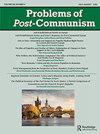环境区域主义与国际组织:对后共产主义的启示
IF 2
2区 社会学
Q2 POLITICAL SCIENCE
引用次数: 9
摘要
摘要区域国际组织被认为是在全球、区域和国家层面推动环境议程的最有效平台之一。然而,全球环境政治研究与比较区域主义之间的对话是最近才开始的。非民主区域组织的出现是比较区域主义的最新发现之一,它们对环境政治的影响值得考虑。NDRO在促进环境议程方面有何作用?国际组织如何在后共产主义地区推进环境议程?本期特刊希望我们通过在环境区域主义和威权区域主义研究之间建立更深入的对话来回答这些问题。这一引言为本期特刊的文章集奠定了理论基础。提出了区分民主和专制环境区域主义的环境区域论的定义和类型,并在此新的理论框架下分析了其对《特刊》的贡献。本文章由计算机程序翻译,如有差异,请以英文原文为准。
Environmental Regionalism and International Organizations: Implications for Post-Communism
ABSTRACT Regional international organizations (IOs) are considered to be among the most efficient platforms in promoting an environmental agenda at global, regional, and national levels. Yet, the dialogue between studies of global environmental politics and comparative regionalism is quite recent. The emergence of non-democratic regional organizations (NDROs) is among the most recent discoveries in comparative regionalism and their implications for environmental politics are to be considered. How do NDROs matter in promoting an environmental agenda? How do IOs advance the environmental agenda across the post-Communist region? This Special Issue aspires us to answer these questions through establishing a deeper dialogue between studies of environmental regionalism and authoritarian regionalism. This introduction lays out the theoretical ground for the collection of articles in this Special Issue. It proposes a definition and typology of environmental regionalism (ER) that distinguishes between democratic and autocratic ER. It then analyzes the contributions to the Special Issue within this new theoretical framework.
求助全文
通过发布文献求助,成功后即可免费获取论文全文。
去求助
来源期刊

Problems of Post-Communism
POLITICAL SCIENCE-
CiteScore
4.00
自引率
12.50%
发文量
33
期刊介绍:
The post-communist countries are the most rapidly changing societies of Europe and Asia. For insight into this twenty-first century revolution, there is no better source than Problems of Post-Communism. Emphasis is placed on timely research covering current economic, political, security, and international developments and trends in Russia and China, Central Europe and Central Asia, Latin America, and Southeast Asia. Clarity and readability make the articles fully accessible to researchers, policy makers, and students alike.
 求助内容:
求助内容: 应助结果提醒方式:
应助结果提醒方式:


